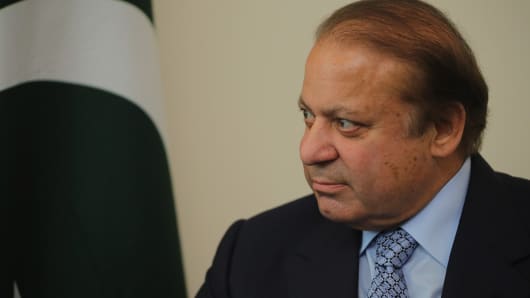
Pakistan democracy at risk after removal of Nawaz Sharif
Nyshka Chandran
The same laws used to dismiss Pakistan’s former Prime Minister Nawaz Sharif
could effectively be applied to other lawmakers, spelling potential
political upheaval and a stronger military — unsavory scenarios for the
nuclear power’s fragile democracy.
Last Friday, the Supreme Court dismissed the 67 year-old
on a failure to announce income in disclosure papers for 2013’s general
election. According to the Supreme Court statement, the former prime
minister demonstrated dishonesty by not declaring monthly salary of
roughly $2,700 from Dubai-based Capital FZE — a company owned by his son
— during 2006 to 2014.
The judicial body based its decision on Article 62 of the
Constitution and Section 99 of the Representation of the People Act —
little-used legislation that require truthfulness and honesty from
elected officials.
Political infighting expected
While Friday’s decision was hailed as a rare example of
accountability in a graft-stricken nation, the fact that such vague laws
were used to remove Sharif could trigger infighting between political parties, strategists warned.
“Having used these clauses to oust the prime minister, the court may have opened Pandora’s box,” Moeed Yusuf, associate vice president, Asia Center, United States Institute of Peace, said in a recent note. “Sharif’s allies have already started bringing charges against their political opponents under the same article; other such cases are sure to follow.”
“Having used these clauses to oust the prime minister, the court may have opened Pandora’s box,” Moeed Yusuf, associate vice president, Asia Center, United States Institute of Peace, said in a recent note. “Sharif’s allies have already started bringing charges against their political opponents under the same article; other such cases are sure to follow.”
“Having used these clauses to oust the prime minister, the court may have opened Pandora’s box.”
Dirty politics, nepotism, and cronyism is rampant in the South Asian economy, ranked 116th in Transparency International’s list of 176 corrupt nations, which means numerous lawmakers could be removed under Article 62.
The court itself has previously referred to the law as a “nightmare” given the difficulty in objectively defining the terms, Yusuf said.
“The fact that Sharif was disqualified on the grounds of Article 62 is potentially very problematic because more than half the current parliament and members of the provincial assemblies could be disqualified on the same grounds,” echoed Rafiullah Kakar, an assistant research officer at the Commonwealth Young Professionals Programme, in a note published by the London School of Economics.
That could spark the purging of an entire political class, which could create a vacuum that would likely be filled by non-democratic forces, he added.
The court itself has previously referred to the law as a “nightmare” given the difficulty in objectively defining the terms, Yusuf said.
“The fact that Sharif was disqualified on the grounds of Article 62 is potentially very problematic because more than half the current parliament and members of the provincial assemblies could be disqualified on the same grounds,” echoed Rafiullah Kakar, an assistant research officer at the Commonwealth Young Professionals Programme, in a note published by the London School of Economics.
That could spark the purging of an entire political class, which could create a vacuum that would likely be filled by non-democratic forces, he added.
Military to benefit
During the 1990s, friction between Sharif’s Pakistan Muslim League
and the opposition Pakistan People’s Party eventually paved the way for
1999’s military coup — many now fear a repeat of history. The army,
experts said, is a clear winner from Friday’s ruling.
“The army gains by discrediting the civilian government. A weakened and humiliated civilian government ensures that public support for the armed forces will remain high as it emerges, once again, as the more competent institution,” said Shailesh Kumar, senior Asia analyst at consultancy Eurasia Group.
But despite its advantageous position and history of coups, the military isn’t expected to take power anytime soon.
“The army gains by discrediting the civilian government. A weakened and humiliated civilian government ensures that public support for the armed forces will remain high as it emerges, once again, as the more competent institution,” said Shailesh Kumar, senior Asia analyst at consultancy Eurasia Group.
But despite its advantageous position and history of coups, the military isn’t expected to take power anytime soon.
“In decades past, if a civilian leader was abruptly removed, the
expectation would be that the army would swoop in to restore order — yet
today, no serious observer of Pakistan expects the military to seize
power,” Michael Kugelman, South Asia deputy director and senior
associate at the Wilson Center, said in a Tuesday note.
“Of course, given the deep clout that the military already enjoys behind the scenes, it has no need to take power directly and likely no desire either, given the arguably unprecedented non-security policy challenges, such as severe water shortages and a serious energy crisis, that afflict present-day Pakistan.”
Eurasia Group also said it expects the powerful army to stay on the sidelines amid the current government turmoil.
Friday’s ruling followed a months-long investigation into the Sharif family’s offshore wealth, which was sparked by allegations of money laundering in 2016’s Panama Papers. The Supreme Court has also ordered a criminal probe into the family based on the Panama Papers’ claims.
“Of course, given the deep clout that the military already enjoys behind the scenes, it has no need to take power directly and likely no desire either, given the arguably unprecedented non-security policy challenges, such as severe water shortages and a serious energy crisis, that afflict present-day Pakistan.”
Eurasia Group also said it expects the powerful army to stay on the sidelines amid the current government turmoil.
Friday’s ruling followed a months-long investigation into the Sharif family’s offshore wealth, which was sparked by allegations of money laundering in 2016’s Panama Papers. The Supreme Court has also ordered a criminal probe into the family based on the Panama Papers’ claims.